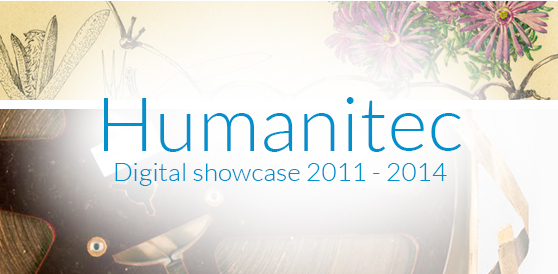Initiative to find digital homes for scarce material

The Humanitec Digital Showcase was a project supported by the Vice Chancellor’s Strategic Fund. All collections included were digitised and curated by the Humanitec / UCT Libraries initiative between 2011 and 2014. In recognition and appreciation of the work done, this entire showcase has been migrated onto the UCT Libraries current digital collections platform, Ibali.
Humanitec and Digital Repository Committee:
Institutional repository work achieved, 2009 to 2014.
"UCT is home to a number of important collections of South African art, photographs, music, audio recordings, and artefacts from a range of disciplines. The enormous increase in worldwide digital connectivity has made it possible for us to share this work with a wide audience: to help preserve South African heritage, and to make it available for research and teaching across the globe. There are of course additional benefits, in particular for the UCT brand: we signal that we have unique collections of great significance, and that part of our scholarship is to make this work accessible to the wider world. We also attract international scholars and students who want to work with the materials we provision. But these valuable collections need to be digitised, and curated for us to have maximum impact.
The significance and need for an institution-wide repository of this kind has been recognised for some time in the Humanities Faculty, and there are several extant initiatives within the Faculty to exhibit and make available its work (see the excellent display at www.arc.uct.ac.za, for instance). The Humanities Information Technology Committee (HUMANITEC) helped found a cross-faculty working group in 2008 to champion a repository, and to bring it into being. The working group met and considered possible models, and took advice from a range of people, including experts from Duke and Rhodes Universities. It worked particularly closely with UCT libraries, and ICTS. In 2010 the working group was awarded a multi-year grant from the Vice-Chancellor’s strategic fund.
The model pursued in the four years of the grant has been to separate the intellectual work of getting materials into a digital repository from the purely technical aspects of curation. Monies awarded are used to make awards to applicants for digitisation of important materials, on the basis of intellectual justification for the proposed work. Successful applicants do the bulk of the digitisation and meta-coding of materials, consulting closely with the Digitisation and Digital Services of the UCT Libraries. A cross-faculty managing committee oversees the awards, reviewing applications, and making policy and business decisions. In sum, the initiative is intended to unify the multiplicity of digital activity around the university by providing a scalable location where material can be stored and managed. The aspiration of the working group has been to facilitate the intellectual work of others, to widen the lane rather than to congest it. A number of outstanding projects have been funded in this way"
Excerpt Article written by Colin Tredoux, Faculty of Humanities, 2014.
UCT Humanitec Committee Members
Colin Tredoux
Renate Meyer
Janine Dunlop
Thomas Franz
Ashley Rustin
Paul Weinberg
Scott Bonar
All the content on the Humanitec site has been written by independent writer Dr Alexandra Dodd.
Acknowledgements
Project manager:
Scott Bonar
Metadata team:
Moira Baard, Hajiera Davids, Anya Kohler, Mandy Noble, Andrea Walker
Library IT:
Wesley Barry, Gareth Dawson, David de la Croes, Warren Hansen, Norman Hebler
Digitisation:
Janine Dunlop, Junaid Lucas, Gary November, Vincent Oliver, Kayleigh Roos, Niklas Zimmer
Special Collections:
Lesley Hart, Busi Khangala, Lisa Kistain, Clive Kirkwood, Renate Meyer, Brian Muller, Debra Pryor, Laureen Rushby, Paul Weinberg



